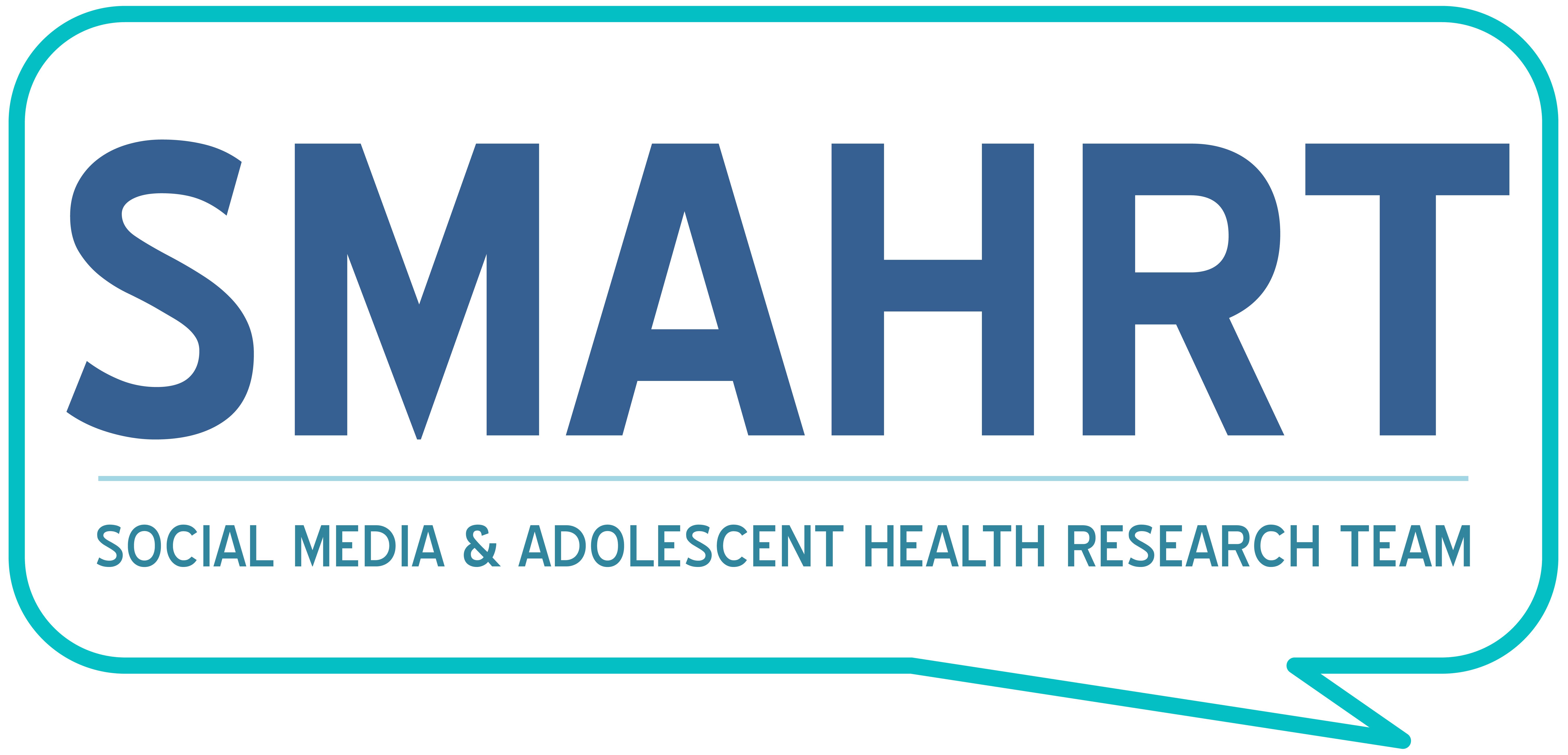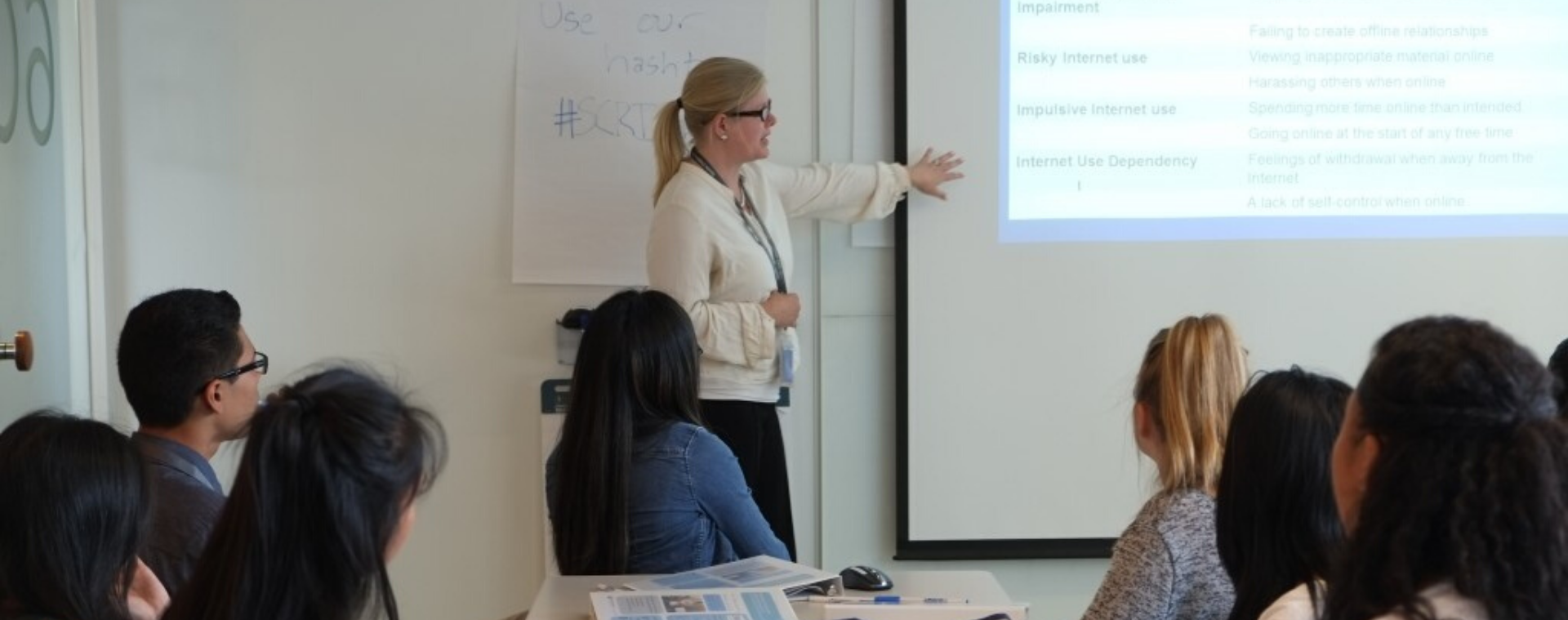Dr. Megan Moreno is the principal investigator and founder of the SMAHRTeam and our mentorship structure.
She is the ultimate mentor.
We have simply lost count of how many individuals Dr. Moreno has mentored over the years, but the structure that she has established has led to successful mentoring relationships across the team.
Within our team, our staff members are mentors to research or communications interns while also being mentored by Dr. Moreno.
Dr. Moreno explains how the mentorship structure on SMAHRT came to be and some of SMAHRT’s staff members, Reese Hyzer, Maggie Bushman, and Brad Kerr share a little about their mentorship relationship with Dr. Moreno.
“My initial training was as a pediatrician,” explained Dr. Moreno. “And so, I went through medical school and then a pediatric residency. A lot of medical training is built on an apprenticeship model which means that you, as a more junior learner, are often provided training and supervision by a more senior learner. And I really, really loved that system. I loved the idea that the people who were teaching me and training me, that they had walked in my shoes.”
With that type of training Dr. Moreno knew that when she was a senior trainee, she was responsible for teaching and training people more junior to her.
“And there’s something really special about medical training that, that apprenticeship model, it’s not just that you’re a teacher. It’s that you’re really a trainer and a role model and a mentor, really. So I feel like that’s when I had some early really positive experiences with mentorship,” she said.
When Dr. Moreno’s career shifted to include research, it made her ponder how she could build a system that would integrate the key elements of apprenticeship such as the idea that even as a learner you are a teacher.
“I think that a lot of the ways that we’ve structured SMAHRT to have people build experience and mentor each other is built off of those, those models that have existed in medicine for a long time,” she explained.
“One of the things that I really like reflecting on in how we’ve set up the mentorship structure on SMAHRT is that one of my very favorite educational theories when I went through my master’s in education training was put forth by John Dewey,” said Dr. Moreno. “It was this idea that learning is doing. I spent a lot of time thinking about that and what that meant and, in medicine, we have a saying of see one, do one, teach one.”
One of the things Dr. Moreno loves about SMAHRT’s work is that when we are working with mentees, we are providing them mentorship in research and part of that needs to be giving them the experience of doing research as a researcher.
“That’s really where the idea of the independent project which is something that everyone does, not just something that people who ask for it or people who get all their other work done get to do it. We, really wanted this to be something that was standard for everyone so that they got to not just see one but do one. And I think that learning by doing means learning to ask those questions. You know, as a research intern you’re often helping to work on other people’s questions. You’re helping to work on our team’s questions.”
“But, I think only be asking your own questions do you really learn what a hard job, but what a fun job it is to come up with your own questions and figure out how to answer them,” said Dr. Moreno.
Until Reese Hyzer, a SMAHRT staff member, joined the team as an undergraduate student her senior year, she had not been exposed to a formal mentoring relationship. The structured mentorship model on SMAHRT helped give her a consistent space to be able to ask her questions, to be able to seek help, and to learn and grow.
“I think that that is the biggest piece of advice that, you know, I would have is just making the mentorship relationship a little bit more formal with regular meetings, regular communication,” explained Reese.
On SMAHRT, Reese never felt afraid to ask a question. She was originally terrified to talk to any professor or anyone that had doctor in front of their name.
“I just kind of never did. But, being on SMAHRT and just being able to see that these people do wanna talk to me. They do wanna hear my ideas. I feel like a valued member. I think that that is something that has really enriched my internship experience for SMAHRT,” said Reese.
Maggie Bushman, another SMAHRT staff member, explains that Dr. Moreno has give her so many opportunities in her career. She has also provided several pieces of advice that she will keep forever.
“One of them is that I’m constantly learning which is something that I learned from Dr. Moreno as a mentor and watching her mentor me,” said Maggie. “It’s okay to not understand something, ask questions, and then move on from there and grow. That’s really something that I try to emulate in my mentoring relationships as well.”
Brad Kerr has been working with Dr. Moreno the longest.
“I’ll just start out by saying Megan is a wonderful mentor. I feel like she is someone who is a friend that I share interests with, but she’s also a helper and a teacher,” explained Brad. “She’s also a great person who’s always just thinking about the next step in my career. So that’s really awesome.”
“I would say that one thing I think that she does really uniquely and really well is to take things that seem like they might be really difficult and make them seem simple and doable,” said Brad. “I feel like she always emphasizes the expertise that we have and already bring to the table to make new skills seem not so remote.”
Brad went on to explain that Dr. Moreno is also really good at describing those tasks in a simple way, making things that seem difficult like they can be done easily.
“She’s very good at just saying no it’s simple. Anybody can do it,” said Brad.
During Dr. Moreno’s experience with mentorship relationships, she discovered the importance of near peer mentors. These are mentors that are just a year or two ahead of where you are, the people who have been where you are recently.
“Those have been some of the most valuable mentoring experiences I’ve had is people who have recently been through something, can sit down with me and say here’s what I didn’t expect, here’s the things to watch out for, here’s some things to prepare for. A lot of SMAHRT’s near peer mentoring is really built off of that model that, even within a couple of years experience, you can grow so much and you have so much to offer to people,” explained Dr. Moreno.
Over the years Dr. Moreno’s near peer mentors have become colleagues, and really good friends.
“It’s been really, really valuable for me and I hope that within the team it’s something that’s valuable for each of us to get to be in that role of near peer mentor,” said Dr. Moreno.
“People can become a mentor before they think that they would traditionally be ready for it. If, within our world or within our academic structure, we had more opportunities for people to step up and mentor earlier, it’s definitely something that allows you as the mentor to grow and you as the mentor to learn. I know that every time I’m in a mentorship relationship, I’m often the one who’s really learning a ton. So taking those opportunities to have those experiences to be both a mentor and a mentee, I think is really part of good science,” explained Dr. Moreno.


